|
|
|
Sort Order |
|
|
|
Items / Page
|
|
|
|
|
|
|
| Srl | Item |
| 1 |
ID:
141437
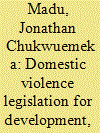

|
|
|
|
|
| Summary/Abstract |
Though laws have been enacted in different parts of Nigeria to address some aspects of gender-based violence, domestic violence persists with serious consequences for social and economic development. Nigeria has not enacted specific domestic law that is applicable throughout the federation, despite the United Nations mandate to all countries to adopt and enforce such laws by 2015. This article examines the causes and nature of domestic violence in Nigeria, and the legal reform needed to address the situation. In addition to library sources, the study used focus group discussions and individual interviews (involving the general population, key informants, legislators and traditional rulers) to discover that enacting specific national domestic violence legislation is necessary to address the problem in Nigeria, but enacting laws alone is not a magic bullet.
|
|
|
|
|
|
|
|
|
|
|
|
|
|
|
|
| 2 |
ID:
141434


|
|
|
| 3 |
ID:
141435


|
|
|
|
|
| Summary/Abstract |
The Constitutive Act of the African Union (AU) provides for the right of the continental body to intervene in the face of war crimes, genocide and crimes against humanity. According to its formulation, Article 4(h) intervention entails military force, which is triggered when a target state fails to discharge its duty to protect its population from mass atrocities. Although Article 4(h) is an ambitious statutory commitment to intervene in a member state by the AU, the Libyan crisis in 2011 showed the ambivalence of the continental institution to act in a decisive and timely manner. The AU's failure to invoke Article 4(h) exposed the need for building the capacity and political will to intervene and to interpret Article 4(h). Therefore, the primary focus of this article is on how Article 4(h) should be interpreted. Flowing from the Pretoria Principles, which seek to provide clarity on the implementation of the AU's right of intervention, Article 4(h) should be viewed as a duty rather than a right to prevent or stop mass atrocities. The duty dimension of Article 4(h) derives from the international instruments that AU member states have ratified to prevent mass atrocities. Rather than being a paper tiger, Article 4(h) should be used in a proactive and timely manner as a military option available to the AU to persuade member states to prevent or halt atrocities. As a last resort, military force pursuant to Article 4(h) should aim at protecting the population at risk and pursuing the perpetrators in order to avoid contravening Article 2(4) of the Charter of the United Nations (UN). Although military intervention can save lives in the short term, it cannot necessarily address the underlying, structural causes of atrocities, such as ethnic rivalries, economic inequalities and scramble for natural resources, among others. Therefore, the prevention of mass atrocities should not be equated with, or be seen through the prism of, Article 4(h) intervention alone. The focus should instead be on the entire spectrum of preventive strategies at the disposal of the AU in the face of mass atrocities, including the African human rights system and the African Peer Review Mechanism.
|
|
|
|
|
|
|
|
|
|
|
|
|
|
|
|
| 4 |
ID:
141438


|
|
|
|
|
| Summary/Abstract |
This article is about the management of security incidents in organisations and companies which are under the protection of private security personnel, whether in-house or contracted. Incidents can be defined as accidental or anecdotal (bird flies into a camera) to a violation of law or company policy. Managing security incidents is one of the key functions of a private security service provider. The purpose of this study is to explore the management of security incidents and the information related thereto, identify shortcomings and find solutions for managing these shortcomings. Interviews were used to gain insight from personnel within the private and government sectors which are served by the private security industry. It was found that security incidents are handled in a routine way by organisations from the different sectors. One major shortcoming is that security incidents and the information related thereto are not managed by security service providers according to an operational framework or model with the required infrastructure and resources. The significance of this study is for security incidents to be managed correctly, so that the information related thereto may be captured accurately, analysed and used proactively and reactively to improve physical protection systems, develop preventative strategies and provide actionable information products in order to reduce crime, increase detection rates and prevent losses.
|
|
|
|
|
|
|
|
|
|
|
|
|
|
|
|
| 5 |
ID:
141436
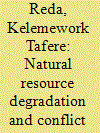

|
|
|
|
|
| Summary/Abstract |
Based on a literature review, this article examines the dynamics in pastoral systems, natural resource conservation and conflict in the drylands of East Africa. It argues that, in the context of East Africa, pastoralism and biodiversity conservation in general are distinct forms of land use that are complementary rather than competitive. The present state of natural resource degradation in the drylands is explained in terms of factors related to ecological and demographic pressures, land use conflicts and inefficient land administration policies. When the customary pastoral institutions of land administration and resource management are threatened, the problem of degradation is further exacerbated and violent conflicts occur among multiple resource users, including pastoralists, farmers and the state. The article recommends the revitalisation, empowerment and recognition of pastoral institutions in a way that ensures effective synergy between the formal and customary structures of resource governance.
|
|
|
|
|
|
|
|
|
|
|
|
|
|
|
|
| 6 |
ID:
141441
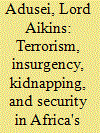

|
|
|
|
|
| Summary/Abstract |
Energy continues to serve as the bedrock of modern economies and the main driver of modern society. For Africa, the production and supply of energy resources such as crude oil, natural gas, uranium, coal, biomass, biofuels and other renewables are an important source of employment, rents, taxes, royalties and profits. This sector brings in several tens of billions of dollars of revenue annually. The production and delivery of such resources, however, depend on critical infrastructures such as pipelines, refineries, processing plants, terminals, rigs, electrical energy pylons, substations, pump stations, vessels, and tankers. These infrastructures have been attacked by terrorists, insurgents, vandals and saboteurs, all of whom see them as targets against which to register their grievances and extract concessions from the state. This paper is a chronological account of some of the documented incidents of terrorism, insurgency, kidnapping, destruction, sabotage, and human casualties suffered in the oil and gas sectors in Africa between 1999 and 2012. It is based on data extracted from the databases of the RAND Database of World Terrorism Incidents and the University of Maryland's Global Terrorism Database (GTD).
|
|
|
|
|
|
|
|
|
|
|
|
|
|
|
|
| 7 |
ID:
141439


|
|
|
|
|
| Summary/Abstract |
This article presents a proposed theory of how war economies are formed and maintained, as well as an integrated policy framework to guide the dismantling of war economies emanating from the proposed theory. Additionally, six potential areas for future research pertaining to the dismantling of war economies are also presented.
|
|
|
|
|
|
|
|
|
|
|
|
|
|
|
|
| 8 |
ID:
141440
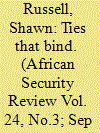

|
|
|
|
|
| Summary/Abstract |
Analysis of the failures of African security forces generally focuses on structural issues such as corruption of senior leadership, insufficient equipment and training, and coup d’état fears driving mistrust of armies that are too strong or effective. However, less examined is the role that sub-state identity plays; using Libya, South Sudan, and Mali as case studies, this paper examines how ethnicity inhibits the development of national armies, divides them, and exposes a critical flaw that adversaries are able to exploit. Given the increasingly ethnic nature of conflict throughout the world, and the rising threat that ethnic conflicts in Africa pose to regional and Western partners, it may be prudent for researchers, policymakers and other stakeholders to examine the critical role that sub-state identity plays in undermining African security forces.
|
|
|
|
|
|
|
|
|
|
|
|
|
|
|
|
| 9 |
ID:
141433
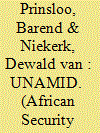

|
|
|
|
|
| Summary/Abstract |
This article examines the geopolitical dynamics associated with the African Union (AU) and United Nations hybrid operation in Darfur (UNAMID) from the start of the Darfur conflict in 2003 until the time when UNAMID became fully operational in 2011. It provides an overview of the complex forces and geopolitical dynamics that affected the deployment of UNAMID and shaped its unique hybrid character. It mainly highlights those primary geopolitical factors that hindered the full deployment of UNAMID. It is concluded that this period was a showcase for the newly established AU and its support for its member states, as well as a new approach for the international community to maintain international peace and security in alliance with regional organisations.
|
|
|
|
|
|
|
|
|
|
|
|
|
|
|
|
|
|
|
|
|